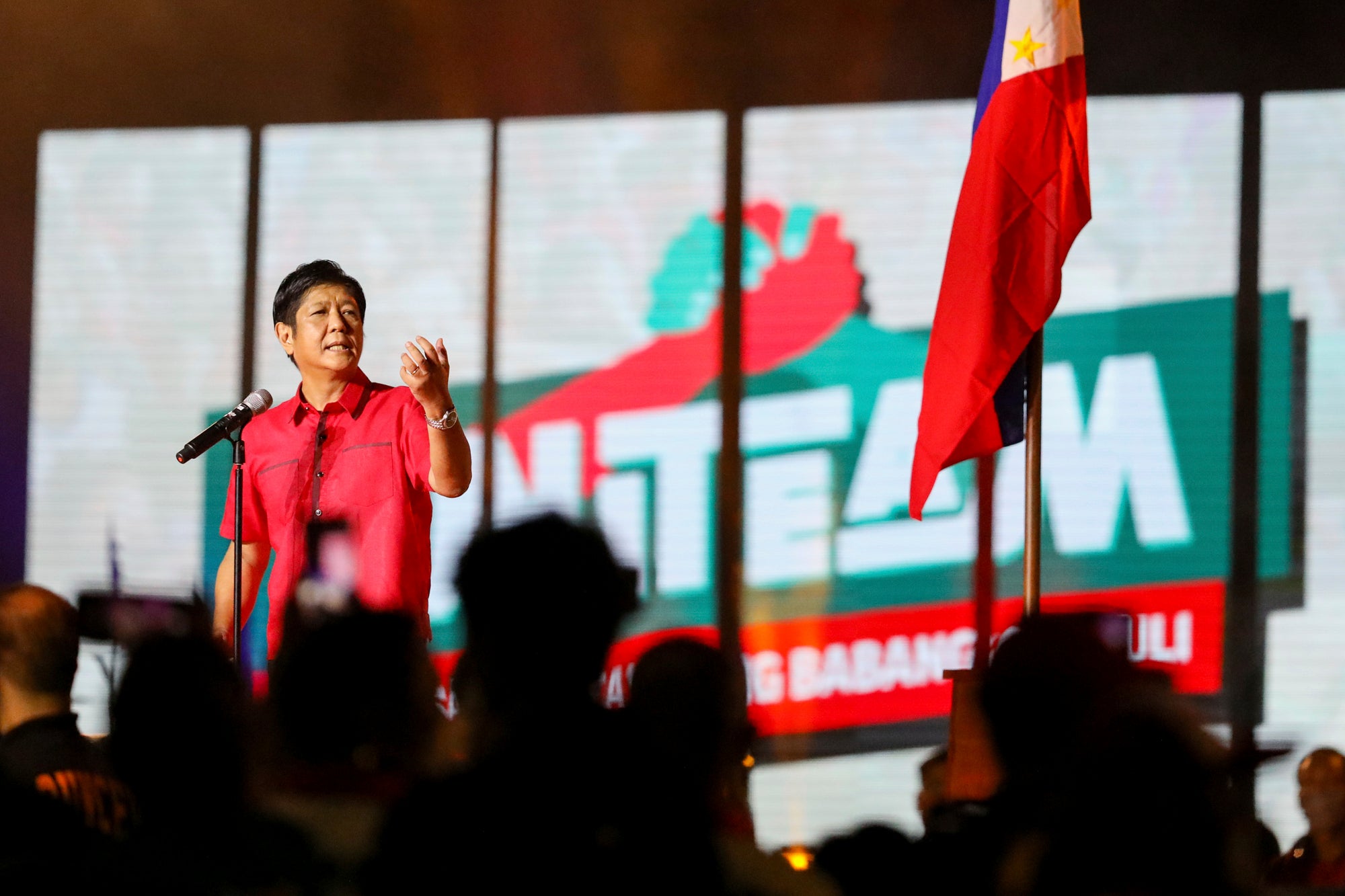Late Philippine dictator's son clears key election hurdle
Philippine election officials have dismissed three more petitions seeking to disqualify the son of the late dictator Ferdinand Marcos from the upcoming presidential election in a ruling that removed a major obstacle to his candidacy, which human rights groups oppose

Your support helps us to tell the story
From reproductive rights to climate change to Big Tech, The Independent is on the ground when the story is developing. Whether it's investigating the financials of Elon Musk's pro-Trump PAC or producing our latest documentary, 'The A Word', which shines a light on the American women fighting for reproductive rights, we know how important it is to parse out the facts from the messaging.
At such a critical moment in US history, we need reporters on the ground. Your donation allows us to keep sending journalists to speak to both sides of the story.
The Independent is trusted by Americans across the entire political spectrum. And unlike many other quality news outlets, we choose not to lock Americans out of our reporting and analysis with paywalls. We believe quality journalism should be available to everyone, paid for by those who can afford it.
Your support makes all the difference.Philippine election officials on Thursday dismissed three more petitions seeking to disqualify the son of the late dictator Ferdinand Marcos from the upcoming presidential election in a ruling that removed a major obstacle to his candidacy, which human rights groups oppose.
Commission on Elections spokesperson James Jimenez said the three petitions against Ferdinand “Bongbong” Marcos Jr.’s candidacy, which were consolidated into one case, were dismissed for lack of merit. A final case remains pending, and petitioners of six dismissed cases have either appealed or intend to do so in a legal fight that will likely reach the Supreme Court as campaigning continues for the May 9 election.
The election commission rejected claims that Marcos Jr. should be removed from the presidential race and permanently barred from seeking public office due to a 1995 tax conviction and alleged falsehoods in his candidacy papers.
Marcos Jr. welcomed the dismissal of what his camp terms “nuisance petitions” and told the petitioners “to stop spreading lies” about him.
One of the petitioners, former Commission on Human Rights Chairperson Loretta Ann Rosales, called the ruling “a major setback to electoral democracy” and said her group will not back down.
Marcos Jr., whose father was overthrown in a 1986 army-backed “people power” uprising, has topped pre-election surveys by a wide margin, alarming proponents of human rights and democracy, including Vice President Leni Robredo who is also seeking the presidency.
Marcos Jr. has described human rights violations and corruption during his father’s rule as “lies.”
Robredo narrowly defeated Marcos Jr. in the 2016 vice presidential race but is trailing far behind him in recent polls for the presidential race.
The other main presidential contenders include Manila Mayor Isko Moreno, a former actor who has impressed many with his rags-to-power life story and cleanup of the capital, Sen. Panfilo Lacson, a former national police chief known for his exploits against crime and corruption, and Sen. Manny Pacquiao the former boxing star who has vowed to jail corrupt politicians and provide free houses to the poor.
Former Election Commissioner Rowena Guanzon disclosed last month that she voted to disqualify Marcos Jr. in the consolidated petitions because his conviction for failing to file income tax declarations from 1982 to 1985 was an offense involving “moral turpitude,” which would bar a candidate from holding public office. But her retirement last week invalidated her vote.
Guanzon accused the head of the commission of deliberately delaying the issuance of the ruling until after her retirement so her vote would not be counted.
The elder Marcos died in 1989 while in exile in Hawaii without admitting any wrongdoing, including accusations that he, his family and cronies amassed an estimated $5 billion to $10 billion while he was in power. A Hawaii court later found him liable for human rights violations and awarded $2 billion from his estate to compensate more than 9,000 Filipinos who filed a lawsuit against him for torture, incarceration, extrajudicial killings and disappearances.
His widow, Imelda Marcos, and their children were allowed to return to the Philippines in 1991. They have since made a stunning political comeback, winning seats in Congress and powerful provincial posts that have brought them closer to the presidency.
Marcos Jr., 64, has served as vice governor and governor of northern Ilocos Norte province, congressman and senator. A sister, Imee Marcos, is currently a senator.